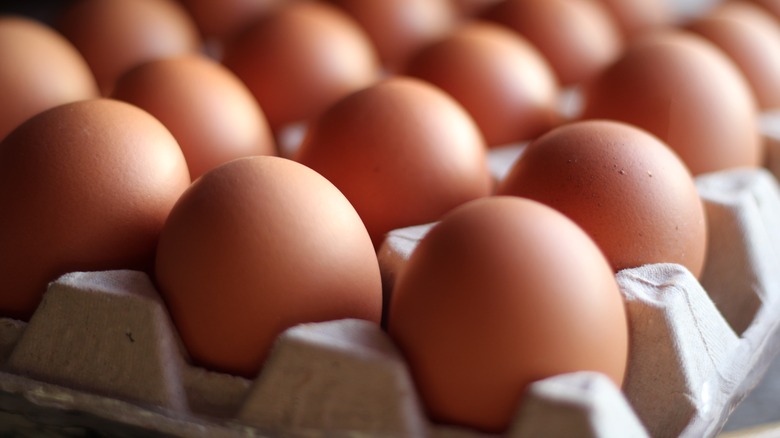How Old Are Eggs At The Grocery Store?
Eggs are an amazing ingredient, and there is no shortage of ways to use them, from creating the perfect scrambled eggs to baking a creamy, hazelnut tiramisu. However, when you pick up a carton of eggs from your local supermarket, have you ever stopped to wonder how old those eggs really are? As it turns out, they could be older than you think.
Back in 2016, a post by blogger Lisa Steele of Fresh Eggs Daily went viral with the claim that grocery store eggs can be up to two months old when you take them home. This is partly based on the USDA regulation that states that the expiration date for eggs be set for no longer than 30 days after packing — not after being laid. So, what's the truth? Even though the USDA requires egg cartons to also be labeled with the date they were packaged, the actual time it takes for eggs to get from producers to stores isn't set in stone. However, according to Business Insider, most eggs make it from farms to stores within a few days of being laid.
If you're curious about when your eggs were packed, you can check the date stamped on the carton. All egg cartons are marked with a packing date using the Julian date format, meaning the number represents the day of the year. For example, if the eggs were packed on August 27, the number would read 239. While the eggs at your local market are unlikely to be months old, they also last longer than most people might guess.
How long are eggs actually good for?
Despite their appearance, eggs are surprisingly hearty, and have a lifespan that lasts far longer than most people might suspect. The chief operating officer for the egg producer Pete & Gerry's, Cameron Whitehead, told Martha Stewart that after being processed for packaging, eggs are usually safe to use for up to 45 days.
The only big tell-tale sign that an egg is old, is runny whites. The thicker the whites, the younger the egg is. While the consistency of whites also depends on the breed of bird, for most store-bought eggs, the consistency of the whites is a good way to judge age. Still, even older eggs with runny whites can be used to make a simple, customizable egg bake. Of course, if you want the freshest eggs possible, always grab perishable groceries from the back of the shelf at the store, where the cartons with the furthest sell-by dates are stocked.
Now, if you need to tell whether an egg has moved past its prime, you can use the popular float test. The idea is to place an uncracked egg in water; If it sinks, it's good to use. However, eggs used in this test should be consumed immediately, as the water can penetrate the porous eggshell and make it more likely to be infiltrated by bacteria. You can also crack an egg into a separate container to test its freshness. If the egg is discolored or smells bad, it's time to toss it.

